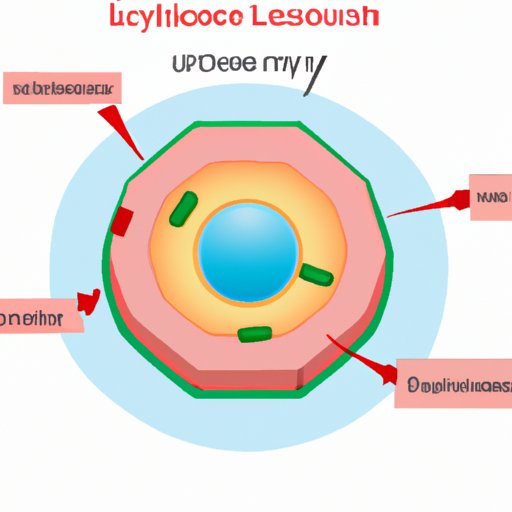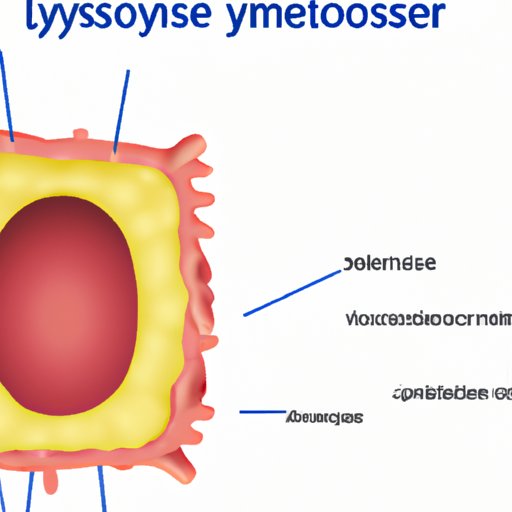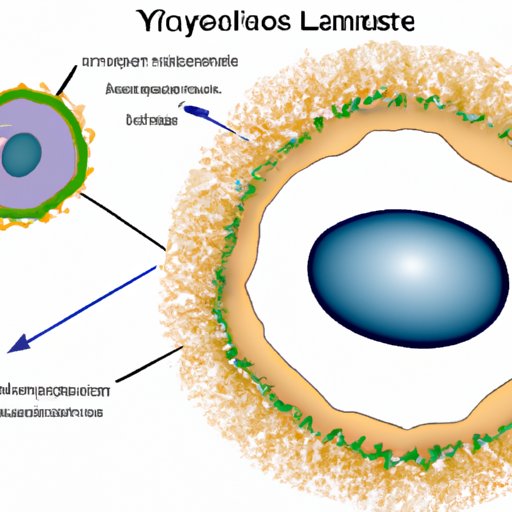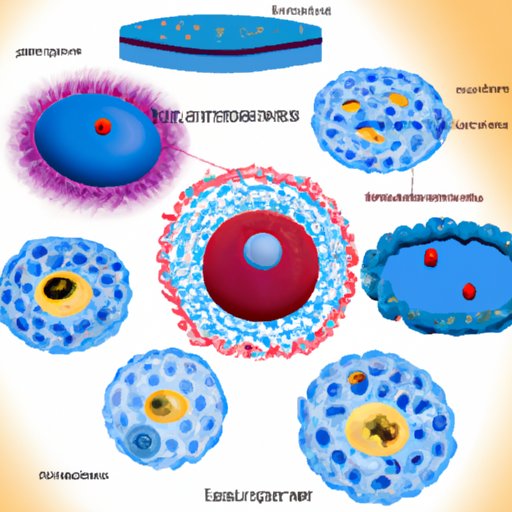Introduction
Lysosomes are small spherical organelles found in the cytoplasm of eukaryotic cells. They contain hydrolytic enzymes that catalyze the breakdown of macromolecules such as proteins, lipids, carbohydrates, and nucleic acids. In this article, we will explore why lysosomes are essential for maintaining the health of cells.
Lysosomes Help Break Down Macromolecules and Recycle Cellular Components
Lysosomes are primarily responsible for degrading and recycling macromolecules and cellular components. The process begins when endocytosis or phagocytosis brings macromolecules and other materials into the cell. These materials are then enclosed in a membrane-bound vesicle called an endosome. Endosomes then fuse with lysosomes, which release their hydrolytic enzymes and degrade the molecules contained within the endosome. The resulting smaller molecules can then be recycled for other metabolic processes.
This process is essential for maintaining the health of cells. Without lysosomes, macromolecules and other materials would accumulate in the cell, leading to decreased efficiency and potentially damaging effects. As Dr. R. Kannan of the Indian Institute of Technology Madras explains, “If these macromolecules are not degraded, they may cause damage to the cell by interfering with other cellular activities.”
Lysosomes Help Maintain Cellular Homeostasis
Lysosomes also help maintain homeostasis within a cell. This is achieved by clearing out damaged or unnecessary organelles, such as mitochondria or peroxisomes. When these organelles become dysfunctional, lysosomes will engulf them and then degrade them using their hydrolytic enzymes. This ensures that only functional organelles remain in the cell, thus helping to maintain homeostasis.
The importance of this process for cell health is clear. As Dr. Marianne V. Parry of the University of California San Diego explains, “Without lysosomal activity, cellular debris accumulates and interferes with normal cellular processes.” Without lysosomes, cells would quickly become overwhelmed with damaged or unnecessary organelles, leading to decreased efficiency and potentially damaging effects.

Lysosomes are Essential for Programmed Cell Death
Lysosomes are also essential for programmed cell death, or apoptosis. During apoptosis, lysosomes will release their hydrolytic enzymes, which will then degrade the cell’s DNA and other cellular components. This triggers a cascade of events that eventually leads to the death of the cell.
This process is essential for the health of multicellular organisms. Apoptosis helps to regulate tissue growth, maintain tissue homeostasis, and remove damaged or unwanted cells. As Dr. Parry explains, “Apoptosis is essential for normal development and functioning of multicellular organisms.” Without lysosomes, this process would not be possible.

Lysosomes are Important for Intracellular Immune Responses
Lysosomes also play an important role in intracellular immune responses. When pathogens enter a cell, lysosomes will engulf them and then use their hydrolytic enzymes to degrade them. This helps to protect the cell from infection and ensure its continued health.
This process is essential for the health of the organism as a whole. Without lysosomes, pathogens could easily spread throughout the body, leading to potentially serious consequences. As Dr. Parry explains, “Intracellular immunity is essential for protecting the host from infection and disease.”

Lysosomes Play a Role in Autophagosome Formation
Lysosomes also play an important role in autophagosome formation. Autophagosomes are membrane-bound vesicles that are used to break down and recycle damaged or unnecessary organelles. During autophagosome formation, lysosomes will fuse with the autophagosome, releasing their hydrolytic enzymes, which will then degrade the organelles contained within the autophagosome.
This process is essential for maintaining the health of cells. Without lysosomes, autophagosomes would not be able to effectively degrade and recycle damaged or unnecessary organelles. As Dr. Parry explains, “Autophagy is important for maintaining cellular homeostasis and for eliminating damaged or unwanted organelles.”
Lysosomal Storage Diseases
Finally, it is important to note that lysosomes can be involved in certain genetic diseases known as lysosomal storage diseases. These diseases arise from mutations in lysosomal genes, which can lead to the accumulation of various substances in the lysosomes. This can lead to a range of symptoms, including neurological deficits, impaired vision, and organ dysfunction.
These conditions can be devastating, but there is hope for treatment. Researchers are currently exploring potential therapeutic targets for lysosomal storage diseases, such as gene therapy and enzyme replacement therapy. With further research, it may be possible to develop treatments for these conditions and improve the lives of those affected.
Conclusion
In conclusion, lysosomes are essential for maintaining the health of cells. They help break down macromolecules and recycle cellular components, maintain cellular homeostasis, facilitate programmed cell death, and play a role in intracellular immune responses and autophagosome formation. Lysosomal storage diseases can also arise from mutations in lysosomal genes. Future research may help to uncover new treatments for these conditions and improve the lives of those affected.
(Note: Is this article not meeting your expectations? Do you have knowledge or insights to share? Unlock new opportunities and expand your reach by joining our authors team. Click Registration to join us and share your expertise with our readers.)
